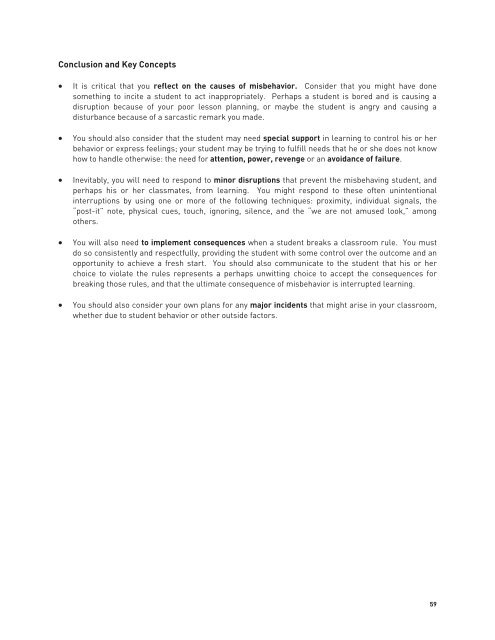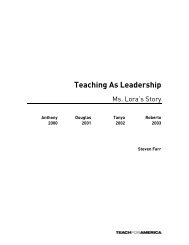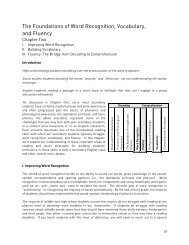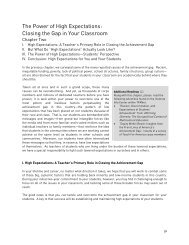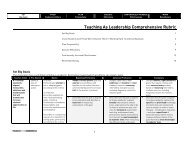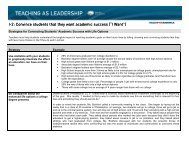Responding to Misbehavior - Teaching As Leadership
Responding to Misbehavior - Teaching As Leadership
Responding to Misbehavior - Teaching As Leadership
Create successful ePaper yourself
Turn your PDF publications into a flip-book with our unique Google optimized e-Paper software.
Conclusion and Key Concepts<br />
It is critical that you reflect on the causes of misbehavior. Consider that you might have done<br />
something <strong>to</strong> incite a student <strong>to</strong> act inappropriately. Perhaps a student is bored and is causing a<br />
disruption because of your poor lesson planning, or maybe the student is angry and causing a<br />
disturbance because of a sarcastic remark you made.<br />
You should also consider that the student may need special support in learning <strong>to</strong> control his or her<br />
behavior or express feelings; your student may be trying <strong>to</strong> fulfill needs that he or she does not know<br />
how <strong>to</strong> handle otherwise: the need for attention, power, revenge or an avoidance of failure.<br />
Inevitably, you will need <strong>to</strong> respond <strong>to</strong> minor disruptions that prevent the misbehaving student, and<br />
perhaps his or her classmates, from learning. You might respond <strong>to</strong> these often unintentional<br />
interruptions by using one or more of the following techniques: proximity, individual signals, the<br />
“post-it” note, physical cues, <strong>to</strong>uch, ignoring, silence, and the “we are not amused look,” among<br />
others.<br />
You will also need <strong>to</strong> implement consequences when a student breaks a classroom rule. You must<br />
do so consistently and respectfully, providing the student with some control over the outcome and an<br />
opportunity <strong>to</strong> achieve a fresh start. You should also communicate <strong>to</strong> the student that his or her<br />
choice <strong>to</strong> violate the rules represents a perhaps unwitting choice <strong>to</strong> accept the consequences for<br />
breaking those rules, and that the ultimate consequence of misbehavior is interrupted learning.<br />
You should also consider your own plans for any major incidents that might arise in your classroom,<br />
whether due <strong>to</strong> student behavior or other outside fac<strong>to</strong>rs.<br />
59


